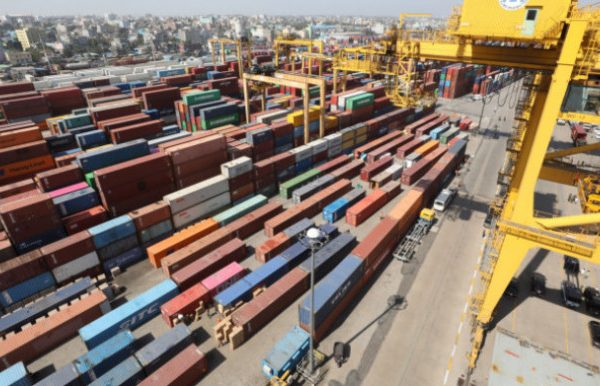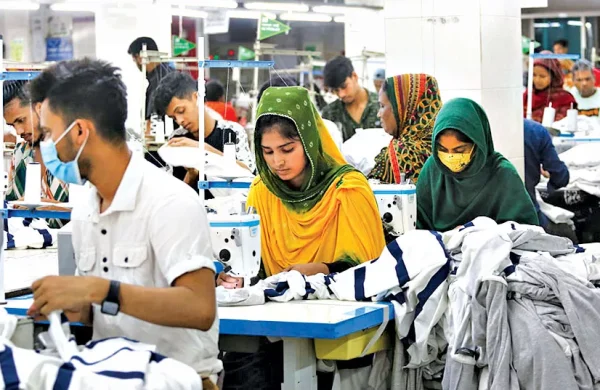RMG exports to all markets rise in first half of FY25
- Update Time : Saturday, February 22, 2025

Staff Correspondent:
Ready-made garment (RMG) exports have apparently rebounded with a notable surge in shipments to all major markets in the first six months of the 2024-25 fiscal year.
Exports to the European Union (EU), the United States, the United Kingdom, Canada, and other emerging markets have all increased. Except for the UK and emerging ones, all the markets registered growth over 10 per cent.
The RMG exports totaled USD 19.89 billion during the July-December period of the fiscal year, which is up by 13.28 per cent from USD 17.56 billion of exports recorded in the same period previous year.
Citing data from the Export Promotion Bureau (EPB), the Bangladesh Garment Manufacturers and Exporters Association (BGMEA) noted that around 50 per cent of the total exports went to the European Union (EU) nations during the first six months of the current fiscal year. Exports to the EU reached USD 9.87 billion, which is 15.22 per cent higher than the previous year’s same period.
Among EU countries, Germany, Spain, the Netherlands, France, Poland, Italy, and Denmark imported more than USD 500 million worth of Bangladeshi garments. Except for Spain and Italy, exports to all these countries grew by over 10 per cent.
Germany remained the top European market during the period, importing USD 2.47 billion worth of garments. The figure is 14 per cent higher than its imports in the previous year’s same period.
Meanwhile, exports to Spain reached USD 1.7 billion, France USD 1.09 billion, the Netherlands USD 1.06 billion, Poland USD 790 million, Italy USD 770 million, and Denmark USD 560 million. Among them, Poland saw the highest growth rate at 28 per cent, while Spain recorded the lowest at just under 3 per cent.
The US continued to be the largest market for Bangladesh as it accounted for 19-20 per cent of total RMG exports. The US imported RMG products worth USD 3.84 billion in the first half of the current fiscal year, which is 17.55 per cent higher than the previous year’s corresponding period.
Apparel exporters are seeing increased export opportunities in the US market as president Donald Trump imposed tariffs on imports from Canada, Mexico and China.
According to them, an additional 10 per cent tariff has been placed on Chinese products, which is expected to prompt US buyers to shift their purchase orders away from China, and create opportunities for the Bangladesh exporters to receive more orders.
Multiple traders that many US buyers had already started placing additional purchase orders even before the tariffs were imposed. The buyers are engaging in negotiations with factories and visiting Bangladesh to explore sourcing options.
Beyond the European Union and the United States, exports to the UK reached $2.16 billion in the first half of the current fiscal year, marking a 6.70 per cent rise compared to the same period last year. Exports to Canada totaled $640 million in the first half of the fiscal year, which is up by 14 per cent from the previous year’s corresponding period.
Bangladesh is also performing well in emerging markets as it exported $3.37 billion worth of RMG products to these markets in the first half, compared to $3.13 billion in the same period last year.
Among the new markets, Japan was the largest importer of Bangladeshi RMG products during the July–December period, with imports totaling $600 million. Exports to the Asian country rose by 5.7 per cent compared to the same period in the previous year.
Besides, exports to Australia reached $430 million, India $370 million, Korea $230 million, and Turkey $220 million. Growth rate was 7.5 per cent for exports to Australia, while 18 per cent for India, 2.84 percent for Korea, and 43 per cent for Turkey.
Mohammad Hatem, president of Bangladesh Knitwear Manufacturers and Exporters Association (BKMEA), that despite a rise in purchase orders, the key challenge is now the low price. Workers’ wages and other costs went up, but foreign buyers are offering lower prices than before. Hence, many purchase orders are not being accepted.
In response to another query, the BKMEA president said the textile mills are struggling to operate due to gas and electricity shortages. Hence, many RMG industry owners are importing yarn from India, which is eventually weakening the local textile mills.
He cited challenges over banking activities and law and order situations and feared that the positive trend in exports might not be retained had these internal issues not been addressed quickly.
















